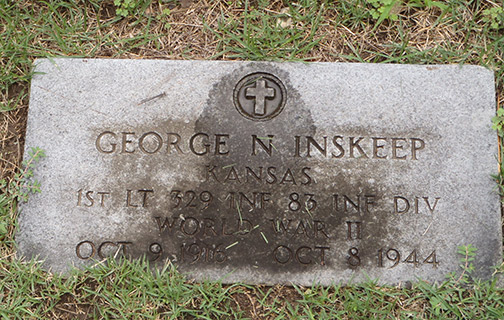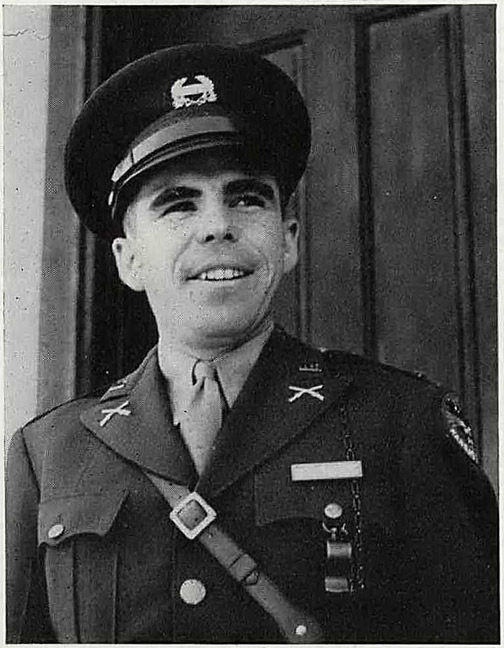George N. Inskeep
Date of Birth: October 9, 1916
Place of Birth: Blue Township, Pottawatomie Co., Kansas
Father and Mother’s Names: Barnes and Blanche Inskeep
Spouse and Children's Names: (wife) Mary Katherine Samuel, (son) George Inskeep, Jr., and (daughter) Vanieta Inskeep.
Date Entered Service: February 1, 1943, Fort Leavenworth.
Service Branch: Army
Service Number: 0-512859
Rank: First Lieutenant
Division/Company/Unit info: 329th Infantry Regiment, 83rd Infantry Division, 3rd Battalion, K Company.
Riley Connection: The 1940 U.S. Census shows the Inskeep family as living in Manhattan Township. Inskeep attended K-State where he studied Agriculture.
Date of Death (and Age): October 8, 1944 (age 27)
Place of Death: Echternach, Germany
Grave Location: Sunset Cemetery, Manhattan, Kansas.
Bio: The Inskeep family lived in rural Manhattan. George attended KSC and majored in agricultural administration. George served with the 329th Infantry Regiment, 83rd Division, Company K. The morning of Oct. 8, Co. K cleared the enemy from the remainder of the city of Echternach, which had been occupied by German troops. George was killed the day before his 28th birthday.
Division Battle Record: On September 24, the 83rd Infantry Division rolled rapidly eastward across France and into Luxembourg to take up positions along the Moselle and Sauer Rivers and relieve elements of the 5th Armored and 28th Infantry Divisions.
Hell in the Hürtgen:
The losses for the U.S. Army in the Hürtgen Forest were great, with at least 33,000 killed and incapacitated, including both combat and noncombat casualties; German casualties were 28,000. The ancient city of Aachen, Germany, eventually fell on October 22, 1944, but at a high cost to the U.S. Ninth Army. The Hürtgen was so costly a battle that Field Marshal Walter Model called it an “Allied defeat of the first magnitude.”
The Battle of the Hürtgen Forest, the objective of which was to stop German forces from reinforcing the front lines farther north in the Battle of Aachen, was the longest battle on German soil during World War II and the longest single battle the U.S. Army has ever fought. The battle area covered 50 square miles east of the Belgian–German border and lasted from September 19 until December 16, 1944.
The division historians noted in The Thunderbolt Across Europe, “Approximately in the center of the triangular area marked by Aachen, Duren, and Cologne lay the Hürtgen Forest. It was here that the men of the 4th Infantry Division were fighting, fighting and dying. In this thickly wooded forest, Jerry easily concealed himself and his weapons. It was a forest filled with death. There were many Heinie snipers; there were machine guns, mortars, and camouflaged and entrenched Nazis with rifles and burp guns.
“Besides all this, there were the ever-deadly tree bursts—artillery shells fired so that they would explode near the tops of the trees and send fragments flying in all directions. In places, nearly every tree contained a booby trap and nearly all the space between the trees was covered with mines.…
“It was here that the 83rd was to be committed. Our mission was to relieve the 4th Division, to continue through the Hürtgen, and to seize the west bank of the Roer River. This would be our first fight in Germany, our first engagement with the enemy in his homeland.”
Fauver recalled, “On December 9, we moved to the Hürtgen Forest and relieved a division that was up there; they were all shot to pieces. I don’t think they had 10 men left out of any company. They were really hurting.”
On the 7th of October, at 1600, the town of Echternach was bombed in preparation for an attack. The bombing was then followed by a heavy artillery barrage, and infantrymen of K Company, with two platoons of tanks attached, went in with guns firing; within the short time of an hour they had reached the center of the town. Here they were met by approximately 2 German companies, plus a machine gun platoon; besides this human resistance, the enemy threw in all the artillery and mortar fire he possessed from across the river. After a few of the initial strongpoints were eliminated the enemy fortunately withdrew to the eastern bank before Speedie's men had a chance to engage them in hand to hand combat. Meanwhile, Company C cautiously walked into the town of Grevenmacher and occupied it.


